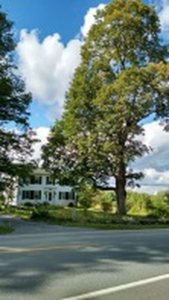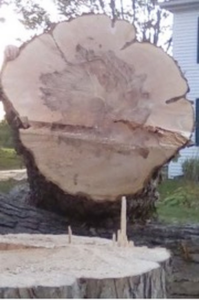 As a custodian of Our Old House, I’m always conscious of how to maintain it and still make twenty-first-century changes without drastically altering or (gasp) destroying the historic integrity of the property. Making those decisions is not always easy, especially when there is clearly no choice in the matter. Cue the drafty ancient windows, the continually-aging floorboards, the old garage with the “waving roof,” and the 90-foot rotting maple trees.
As a custodian of Our Old House, I’m always conscious of how to maintain it and still make twenty-first-century changes without drastically altering or (gasp) destroying the historic integrity of the property. Making those decisions is not always easy, especially when there is clearly no choice in the matter. Cue the drafty ancient windows, the continually-aging floorboards, the old garage with the “waving roof,” and the 90-foot rotting maple trees.
We still deal with the windows and the floors (not a level inch anywhere in this house!), but the garage is gone, and so are the trees, those huge maple trees that graced the front of the property, blocking dust, noise, snow, wind, and the hot summer sun while shading the front rooms. They provided sap for maple syrup and sugar for even the earliest generations of my family, bushels of leaves for mulch, and perches for multiple varieties of birds.
The family story states that originally five maples were planted sometime in the 1840s by a friend and neighbor of Asa Williams, Jr., and they have become as much a part of the history of this house as the house and its families. I may be the only family historian who traces the provenance of family trees as well as the lineage of relatives.
While the house has stood solid for over 230 years, the maples grew. And grew. And then grew more. Topping out at about ninety feet, four of them stood sentry in front, side by side, until The Grim Sawyer noticed our beautiful trees.
Sometime in the early 1960s, when my mother and I returned home from school after a strong storm, we found the first maple stretched across the road in a most undignified manner. Its fate was gruesome and involved the power company and large chain saws. The stump remains as the base for a clump of daylilies and a new sugar maple.
Its fate was gruesome and involved the power company and large chain saws.
The maple tree that had been growing on the south side of the house had always been my playground, supporting a swing, big enough to climb, and shading many family al fresco suppers beneath its limbs. Again, a heavy storm about 1980 brought it down, missing the house, garage, grape arbor, and flower beds. Mother Nature is a good shot.
Soon, it became clear that the old maples were aging faster than our efforts to cable, prune, or support them. My mother had a third one taken down, and in August 2012 I had to watch another come down for safety’s sake.
There remained one maple tree in front of My Old House, and it, too, had aged too long. A home for squirrels, chipmunks, and carpenter ants, it harbored more soil-creating rot than any ancient tree should, and would not have withstood another strong, sustained wind. It, too, came down before it fell on its own, possibly on us and Our Old House, or some unsuspecting driver passing by (I’m tempted to nominate several speeders as candidates for “the fall”). We took a photo of one section, in color, because, really, how often do you get to see the inside of a huge tree?
 We counted the rings, the arborist counted the rings, and we all stopped at 173-plus rings because the rest were not defined well enough to count. That put its probable planting sometime in the early 1840s, when Asa Williams Jr. (1795-1857) owned the house. One family story verified, at least in part. Maybe Junior wanted to replace some of the trees his father had worked so hard clearing away!
We counted the rings, the arborist counted the rings, and we all stopped at 173-plus rings because the rest were not defined well enough to count. That put its probable planting sometime in the early 1840s, when Asa Williams Jr. (1795-1857) owned the house. One family story verified, at least in part. Maybe Junior wanted to replace some of the trees his father had worked so hard clearing away!
It’s not like we are without maple trees on this property! We have enough to create fall leaves two feet deep over the entire yard. But this is the last of the historic maples, a ninety-foot tall, four-plus-foot diameter giant of my childhood, a mature tree that appears in the oldest house photos I have. While I try to maintain the unaltered appearance of My Old House, this is one major player I can neither control nor ignore.
I have already started replanting a sentry line of maple trees, but I’ll never see them mature to full glory. (I age faster than they do!) Perhaps in another 173-plus years, someone else will have to make a decision about whether to take down the trees or maybe the house itself!
Share this:

About Jan Doerr
Jan Doerr received a B.A. degree in Sociology/Secondary Education from the University of New Hampshire, and spent a long career in the legal profession while researching her family history. She has recently written and published articles for WBUR.org’s Cognoscenti blog: “Labor of Love: Preserving a 226-Year-Old Family Home and Preparing to Let It Go” and “The Value of Family Heirlooms in a Digital Age.” Jan currently lives with her attorney husband in Augusta, Maine, where she serves two Siamese cats and spends all her retirement money propping up a really old house.View all posts by Jan Doerr →